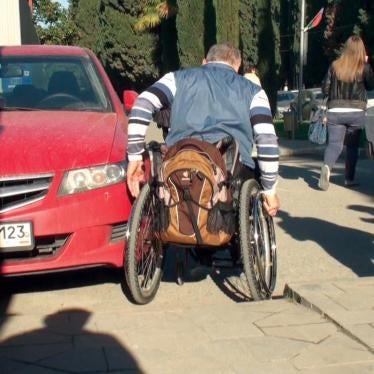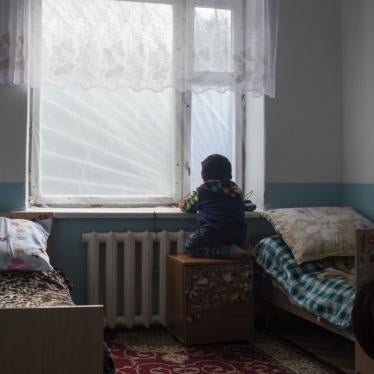Moscow – During a recent visit to Sochi, Russia, I met 26 year-old “Maria” in the third-floor municipal apartment she shares with her mother, just a few miles from the gleaming new Olympic facilities awaiting thousands of athletes, fans, and other visitors. Maria has limited use of her legs and uses a wheelchair. Sitting in a room dimly lit by a window, she told me that she is usually shy and doesn’t like to speak publicly about her disability, but that she has things she needs to say about living with a disability in Sochi. “On television, they talk and talk about how everything will change in the city by the time of the Olympics,” Maria told me “They have said that for years, and nothing has changed.”
At the time of our meeting, Maria hadn’t left her apartment for four months. The elevator in her building works only sporadically because of frequent power outages in the neighborhood. The steps at the building’s entrance are fitted with narrow metal rails for wheelchairs, ubiquitous in buildings and pedestrian underpasses across Russia, but the rails are too steep for Maria to use.
The six month countdown is underway to the March 2014 Winter Paralympics in Sochi, Russia. The Paralympics are an opportunity for hundreds of athletes with disabilities to compete in five winter sports, including alpine skiing, biathlon, cross-country skiing, ice sledge hockey, and wheelchair curling. But as Russia prepares for plaudits over hosting the Paralympics, it is important to underscore the profound obstacles faced by the millions of people with disabilities living in the country today.
In Sochi I visited some of the venues where several of the Paralympic competitions will take place. I toured buildings with gently sloping ramps and elevators to make entrances easily accessible; lowered shower knobs and clothing hooks in the athletes’ dressing rooms; contrasting paint lining doorways for people with low vision; and elevator buttons with Braille.
All in all it felt like a lot of effort had gone into making sure Paralympic athletes and other visitors with disabilities would feel welcome in the Olympic Park. The government has also made efforts to extend this hospitality in the city of Sochi itself, promising hundreds of accessible buildings, buses and transportation hubs. In a February 2013 meeting with Human Rights Watch, one official told us that “Sochi can be a model city for Russia” in its efforts to promote social inclusion for people with disabilities.
Seeing the Olympic venues and learning about Russia’s ambitious accessibility plans left strong impressions, but Maria’s experience is telling of how Russia treats people with disabilities removed from the public eye. The number of retrofitted buildings and accessible buses are not meaningful if people living with disabilities in Sochi cannot use these services, in the absence of basic rights such as accessible housing.
Maria’s situation is unfortunately not unusual in Russia, which is home to at least 13 million people with disabilities.
Many people with disabilities Human Rights Watch interviewed in Sochi and other cities said that they aren’t able to get out of their homes or use public transportation. As a result, they find themselves unable to do many or all of the most fundamental tasks of daily life that most people take for granted: getting an education, going to work, visiting the doctor, or socializing with friends.
When people we met have sought assistance in being relocated or getting the physical accommodations they need for their homes, as mandated by their state medical documents, the government failed to act on their requests. Maria, for her part, has appealed to the Sochi administration several times to be relocated, but was told no apartments are available.
Important progress has been made in Russia. When hosting the Summer Olympics in 1980, the Soviet Union refused to host a Paralympics, claiming at the time, “There are no disabled people in the USSR.”
The Russian government’s decision to host the Paralympics builds on its national and international commitments to ensure the rights of people with disabilities. Federal law guarantees that physical infrastructure be accessible to people with disabilities, though it lacks concrete enforcement mechanisms. In 2012, Russia ratified the UN Convention on the Rights of Persons with Disabilities, which binds it to developing accessible physical infrastructure, among other provisions. The International Paralympic Committee, which oversees the Paralympic Games, should insist Russia seize on the momentum of the Paralympic Games to ensure that the government leaves a truly lasting positive legacy for people with disabilities in Sochi and across the country.
Above all, Russia should listen to the voices of those who are most directly affected, include them in policy decisions, and respond to their appeals to make their homes, commutes, and communities more accessible. There’s no better time to do this than now.
Andrea Mazzarino is a researcher at Human Rights Watch and author of the new Human Rights Watch report Barriers Everywhere: Lack of Accessibility for People with Disabilities in Russia.







